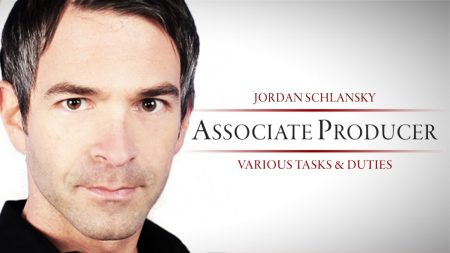A producer is someone who works on all aspects of a film or TV project, including:

Jordan Schlansky is a famous Associate Producer on Team Coco
- Development
- Pre-production
- Production
- Post-production
- Release
Producers will work on a project starting with the draft of a script through to the film’s release in theaters and beyond.
Who Does a Producer Work With?
A producer works with virtually everyone on a film or TV project, from the entire production team to the distribution and marketing teams.What Does a Producer Do?
Producers take on a variety of roles for every project. Their duties and responsibilities typically include:- Purchasing and developing projects
- Securing rights to projects if applicable
- Hiring and managing members of the team, which can include directors, writers, managers, department heads, talent, key crew, and more
- Setting a budget
- Securing funds for the project from investors, personal funds, and/or a studio
- Overseeing the project to make sure it stays within the budget
- Building a schedule for production, often involving production management software
- Overseeing post-production, including editing, picture lock, and music composition
- Marketing the project
- Working with a PR team to generate ongoing buzz for the project
Types of Producers
You’ll also find a variety of producers working on any one project. The different types of producers include:- Executive producer
- Associate producer
- Producer
- Co-producer
- Line producer
- Supervising or development producer
- Coordinating producer
- Consulting producer
- Segment producer
- Field producer
Executive Producer
An executive producer oversees all other producers in a production. Executives are typically more prominent names (think: the Spielbergs of the movie world) and may work on a project in name, but are more hands-off in the day-to-day aspects of a production. Executive producers often help with the budget or may only be involved in securing financing.Associate Producer
An associate producer, commonly shortened to AP, will coordinate on-set life. An AP will assist in tasks such as:- Scheduling
- Table reads
- Assembly and delivery of notes and ideas

Jordan Schlansky is a famous Associate Producer on Team Coco
Producer
The general term “producer” typically refers to the person overseeing all aspects of a project. Producers will manage everything from deadlines to egos to network executives and talent, making sure to keep the project moving forward.Co-Producer
Anyone on a team who helps push a project forward is considered a co-producer. This role can apply to anyone on this list.Line Producer
A line producer deals with creating a budget. These producers also manage staff as well as the various daily challenges of production.Supervising or Development Producer
A supervising producer, also called a development producer, helps guide the project through its different stages. This type of producer works on a project from idea to speculative screenplay, and through rewrites to the shooting script. Many times, the supervising producer will become an executive producer, or at least work closely with the executive producer.Coordinating Producer
A coordinating producer will help all the teams of producers on a given project. A coordinating producer might work with supervising producers to ensure the project’s development and script are going well.Consulting Producer
A consulting producer works on a reality show or live television program, contributing what the host says leading into and out of the segment and guiding the show’s overall tone.Segment Producer
A segment producer is another role that is specific to reality shows or talk shows. These producers work specifically on new segments for each show.Field Producer
A field producer comes in whenever a production goes outside the studio or soundstage. This producer will go on location to help produce segments or other components of a production off-site.Executive Producer vs. Producer
The executive producer plays a different role than other producers on a project. For instance, an executive producer could find the script or a book to option, and then hire a producer to bring the project to life. A producer, on the other hand, might be working on a script with a writer and then contact an executive producer to get financing for the project.The executive producer sits at the top of the hierarchy. Though they work closely with other kinds of producers, their job description is different.Overall, an executive producer typically doesn’t get involved with day-to-day aspects of a project, but a producer is deeply involved with those daily details. A producer will usually answer to an executive producer in terms of the project budget.How To Become a Producer
While there is no one path to becoming a producer and no standard length of time someone must be in the industry to progress, most producers have attended a film school and earned a degree. You’ll want to learn the ins and outs of filmmaking from the ground up. Knowledge of what it takes to tell a good story will prime you for success as a producer.Additionally, training in one relevant field can often carry over into different producing roles. There’s a degree of interchangeability in the various roles of a producer. Starting as an assistant is an excellent way to get your foot in the door.How To Find Producing Jobs
Most graduates enter the industry at lower-level assistant positions. At that point, your progression will depend on your talent, ambition, and the opportunities you find.You can look for assistant positions at:- An agency
- A management company
- A production company
What Is a Producer’s Workplace Like?
Producers need to be able to work under pressure in a high-stress environment. They often have short assignments like commercials or training videos, or long assignments such as documentaries or feature films. Hours are often long and irregular. As a producer, you have to be willing to work evenings as well as weekends and holidays.Producers may be self-employed or employed by the motion picture company. In addition to film, producers may also work in the following industries:- Cable TV
- Performing arts
- Sports
- Radio
Skills Needed To Become a Producer
A producer will need to have a variety of skills to be successful in their role. Skills that are key to becoming a producer include:- Business acumen: A producer needs to understand the market, knowing how and where to make money. This is particularly important for executive producers who plan to finance projects themselves.
- Commercial awareness: To market a project successfully to distributors and the public, a producer needs to understand what makes a film or TV show successful.
- Leadership abilities: A producer should be able to communicate well with the whole team, motivate others, and take the lead on decisions.
- Management abilities: A producer will need to make budgetary and management decisions to keep a project running.
- Networking skills: A producer will draw on a network of directors, actors, and agents to put together the best talent pool for every project.
- Organizational skills: A producer must be on top of the entire project, all the time. The producer will balance scheduling, budgeting, and more.
- Storytelling skills: Since producers will need to approve creative decisions, they also need to know how to tell a story well.
- Wide-ranging knowledge: A producer should be knowledgeable about all the creative processes that go into a project, including directing, editing, and screenwriting.
Recent Posts
All content copyright © Nashville Film Institute




